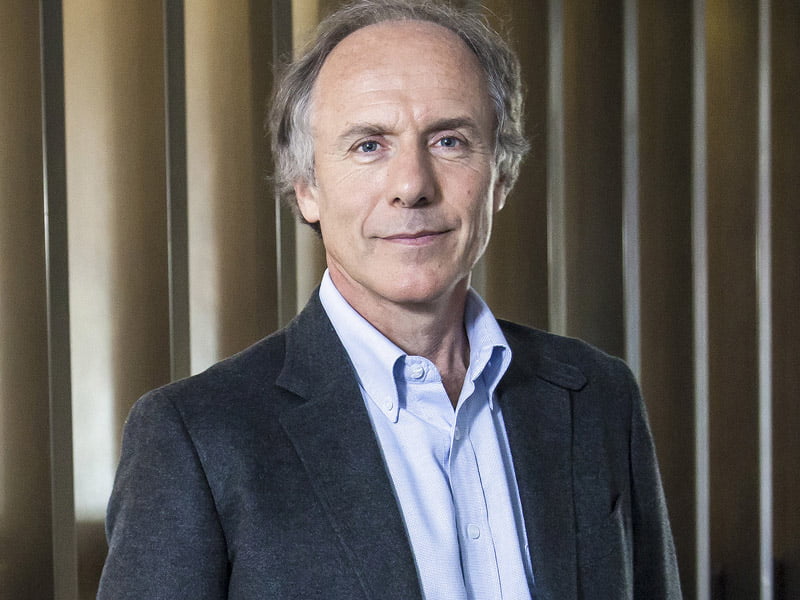The Prime Minister has clearly got the man he wanted as the nation’s new Chief Scientist with the appointment of Dr Alan Finkel, who can claim not only a distinguished career in research and academia, but is also a successful businessman and veteran of Silicon Valley.
In fact, Dr Finkel looks tailor-made for the position, even if he does also carry with him some inconvenient and forthright views. (The Prime Minister looked like he might have a conniption at the press conference yesterday when Dr Finkel all but declared an end to coal in one breath, while opening the door to a debate about nuclear power in the next).

Dr Finkel’s appointment as Chief Scientist was announced by Malcolm Turnbull at Parliament House in conjunction with Industry Minister Christopher Pyne and Assistant Minister for Science Karen Andrews. He will succeed Professor Ian Chubb when he finishes his four-year term at the end of the year.
Everything this government has said about science and innovation policy in Australia since the change of leadership has been framed around improving the commercial outcomes of Australian research, and boosting the collaboration between research and industry.
The appointment of the new Chief Scientist is no different. Dr Finkel is currently Chancellor of Monash University and President of the Australian Academy of Technological Sciences and Engineering (ATSE). He is a neuro-scientist and an electrical engineer.
But it is success in business that makes him stand out. This is what makes him interesting as the PM’s choice of Chief Scientist, and this is what sends a clear cultural message about the PM’s innovation agenda.
Dr Finkel did the fundamental research for his PhD in looking at how communications between brain cells work. He combined this work with skills gained in undergrad electrical engineering to develop a new kind of instrument for measuring that brain activity.
He then took that work, and founded a company Axon Instruments in the US, and for many years was extremely successful – based in Silicon Valley – building highly technical instruments for scientists.
This is “translational” work. That is, it is the “translation from the pure to the applied, [and] across the fence into the commercial world.” From pure research to commercial product, and the nexus between public research and private industry is the focus of much of Mr Turnbull’s messaging.
There is an interesting symmetry that is emerging. Australia now has a Chief Scientist who is a founder and Silicon Valley veteran, a CSIRO chief executive in Larry Marshall who is a founder and Silicon Valley veteran, and the head of its newly-established data research organisation Data61 who is a founder and Silicon Valley veteran.
It remains to be seen whether the Innovation statement due before the end of the year carries with it the kind of policy changes that will improve Australia’s quite poor performance in this area.
As Christopher Pyne said, “We are number six in the world in terms of the OECD in the quality of our research. We’re number 33 in the OECD out of 33 countries in the commercialisation of our research.”
Certainly Data61’s new CEO Adrian Turner is very happy about Dr Finkel’s appointment. “It’s a great choice,” he says, adding that Dr Finkel “appreciates business needs science, and science needs business.”
He is a “practitioner who deeply understands the key stakeholder groups in Australia’s innovation ecosystem and the role of technology and entrepreneurship in creating new industries at a critical juncture for the country.”
The Silicon Valley symmetry is interesting.
At the press conference yesterday, the Prime Minister asked Dr Finkel to nominate which country does “the innovation piece best.” He named Silicon Valley.
“I like to think of Silicon Valley as a country because it’s a unique ecosystem and there is no single message to take from there. It is a complex interaction,” he said. “True interaction does require a complex set of approaches. There is no simple solution.”
The appointment is good news for the software and data and computer science in this country. Dr Finkel will surely place more emphasis on these critical areas of activity than the eminent man he is replacing.
Prof Chubb deserves the accolades he is receiving. He was Chief Scientist during a difficult period, and devoted huge energy to the communicating the science message. And he has had great success – in the end, after years of fruitless toil – in getting the importance of STEM education into the public psyche.
Importantly, Prof Chubb was able to build an alliance with the powerful Business Council of Australia on STEM.
But he was never a particular friend to our sector. And it is a great shame that Professor Chubb did not view the important work of data scientists and computer scientists in the same light as scientists from other fields.
It was as if these information sciences were a bit too “applied”. Not pure enough.
So now, when government is so focused on these “translational issues” – translation from pure to applied to commercial – it seems that in Dr Finkel, the Prime Minister has found his man.
*Photo Credit: Jaime Murcia
Do you know more? Contact James Riley via Email.

